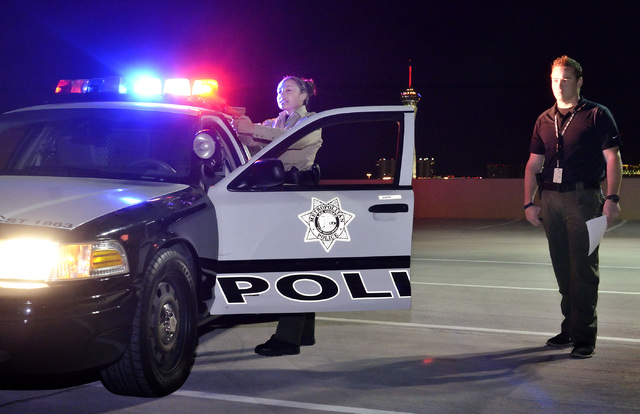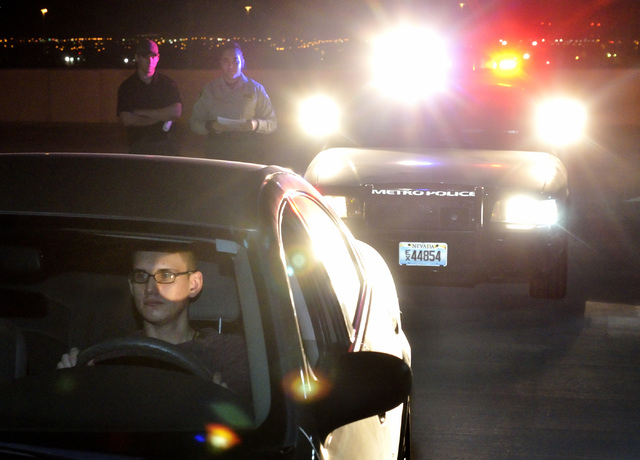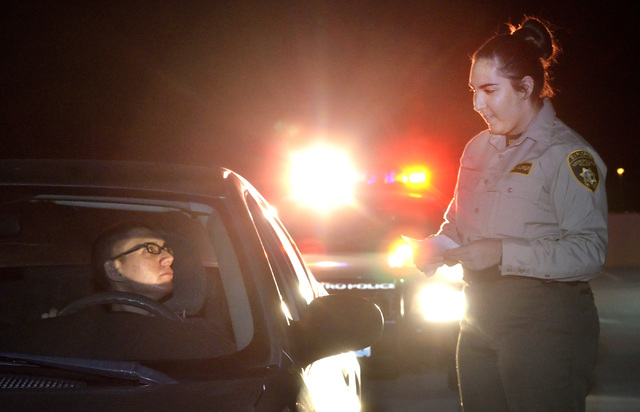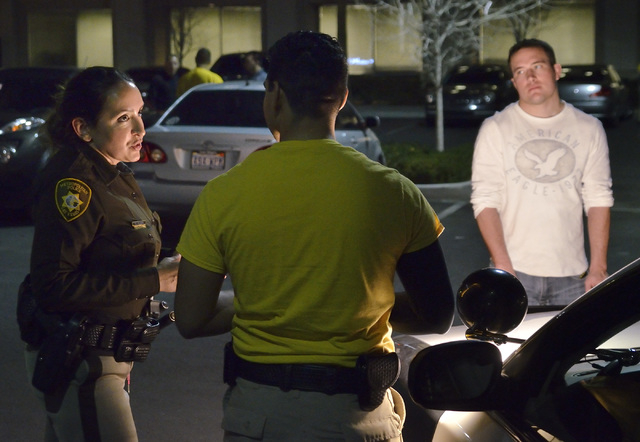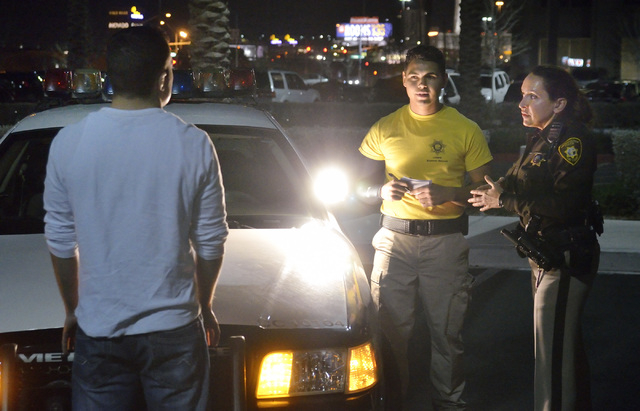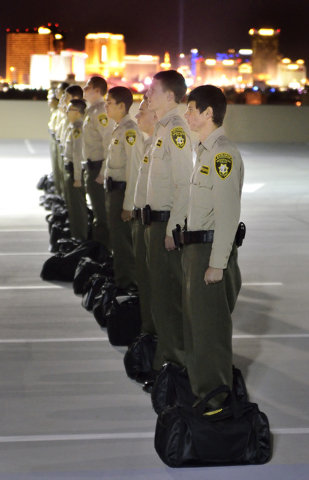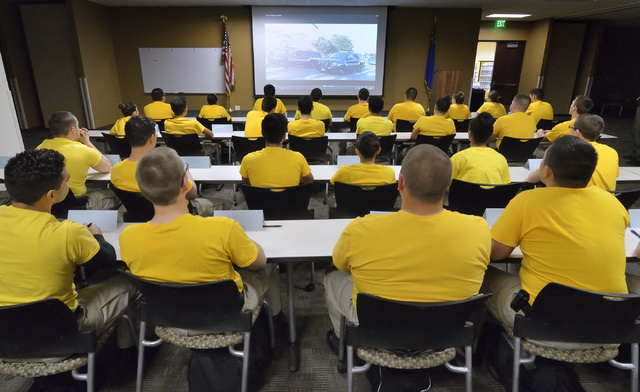Metro’s Explorer program teaches young Las Vegans basics of law enforcement
For nearly 37 years, the Las Vegas Metro Explorer program has been teaching young Las Vegans the basics of law enforcement.
From crime scene investigation to policing, corrections and dispatch, residents aged 16 to 20 can choose one of four programs to dedicate as little as six months or as much as four years to get up-close training.
Explorers are divided into four “phases,” with Phase 1 explorers being the newest young officers and Phase 4 the most experienced. Phase 1 Explorers spend their first six months in the classroom, studying police vocabulary and memorizing radio codes. By Phase 4, Explorers perform mock SWAT operations and join on-duty officers for police car ride-alongs. Semesters last six months each, and Explorers can advance up to two phases a year.
With more than 60 in this semester’s Phase 1 group, Metro’s most popular Explorers course of study by far is policing.
Brittany Pool, 16, is one of them. The junior at Veterans Tribute Career &Technical Academy said her mother spent time in prison. Knowing that pushes her to keep herself and her family on the straight and narrow.
“I’m inspired to do better for myself and for them as well,” Pool said.
Others, like Brandon Wolden, said they joined to pursue a passion for public service.
A hopeful Army Reservist and aspiring police officer, Wolden, 19, hopes his Explorer experience eventually will give him an upper hand in Metro’s academy.
“It’s going to be second nature by the time we get there,” he said. “The stuff you learn here is invaluable.”
But it’s not all roses for every Explorer.
Lashauna Sims, 18, joined because her dad was an Explorer. Though Sims said the program looked fun at first, six months of extra classroom time in addition to homework and school choir has, thus far, been more than she bargained for.
“They keep you on your toes,” Sims said. “You just don’t know what kind of mood the officers are going to be in.”
In addition to weekly meetings and 20 hours of monthly community service, Phase 1 Explorers are given weekly quizzes and two comprehensive exams. If they don’t pass the exams, they have to repeat the six-month phase.
“We have to learn pretty much everything the officers know, and you can’t jam it in all at once,” said Gabe Villanueva, 19, a student at UNLV. He said he played baseball at Rancho High School and that the time commitment as a Phase 1 Explorer is about equal to playing a high school sport.
Before getting the chance to be an Explorer, applicants are subject to a background check and possibly a drug and polygraph test, Explorer spokesman Michael Rodriguez said. Roughly 5 to 7 percent of applicants are denied acceptance to the program, Rodriguez said. Applicants can be rejected for having a criminal history with felony, alcohol or drug-related charges.
Once in, and after completing Phase 1, the program gets to be a little more hands on.
Starting in Phase 2, Explorers can join officers on ride-alongs. They also perform mock car stops, learning how to detect everything from speeding vehicles to drunk drivers. Phase 3 Explorers focus on crime scenes, domestic violence, responding to disturbance calls and report writing.
In Phase 4, policing Explorers learn SWAT procedures and how to rescue hostages and compete in nationwide Explorer contests.
Ben Wood, 18, is Metro’s Explorer commander, the highest-ranking student in the program. A CSN student and Phase 4 Explorer, Wood has access to weekly ride-alongs and a say in the program’s recruiting efforts.
“Going with a police officer on a 10-hour shift is an amazing experience,” he said. “You see a lot more things than you’d expect.”
Metro started its Explorer program in 1978 with 13 young Las Vegans — all males.
By September 2014, Metro’s 187 students showed more of the valley’s diversity: 68 were women or girls, 98 were Hispanic, 14 were black and 10 were Asian.
In January, the program took in a record 200 applications. Allotted applications were filled in only 30 hours, Rodriguez said, and more than 150 Phase 1 students are expected to start in March.
Rodriguez said social media combined with participation in local high school career fairs has helped recruit more Explorers than ever. Besides managing the Explorer Facebook and Twitter accounts, Rodriguez makes frequent posts to Instagram and uploads video to Metro’s Youtube channel.
“We use social networks extensively but also emphasize that face-to-face contact,” Rodriguez explained. “It’s cool for kids to see us in person and make that personal connection, too.”
Rodriguez and other Metro staffers volunteer for the program, so funding is already built in to the department’s budget.
For Explorers, the chance to learn and train with police might seem like a no-brainer.
But what’s in it for the roughly 50 Metro staffers volunteering up to 15 hours a week?
For Rodriguez, it’s about giving back.
Before starting with Metro, Rodriguez was an explorer in his home town of Ann Arbor, Mich. He said the connections he made as a teenager eventually led to a full-time job in Las Vegas.
“If it wasn’t for this program, I wouldn’t be here,” he said. “It’s a pay-it-forward thing.”
Contact Chris Kudialis at ckudialis@reviewjournal.com or 702-383-0283. Follow @kudialisrj on Twitter.



